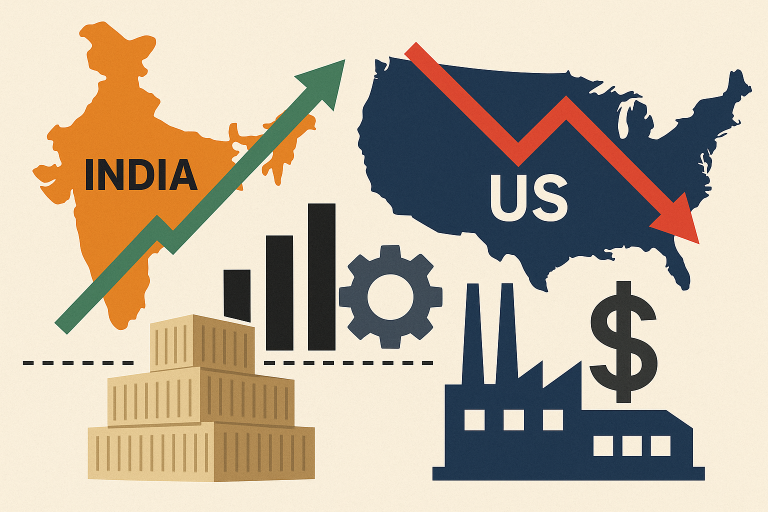India’s economic activity showed early signs of cooling in November as global trade tensions began to filter into domestic performance, according to flash data from HSBC Holdings Plc.
The slowdown reflects how tariff related disruptions in the US are feeding into India’s manufacturing and export environment at a sensitive moment for labour intensive sectors.
While overall business activity remains in expansion territory, the shift comes after months of strong readings and arrives alongside trade numbers that reveal how India’s biggest export market is now a major source of pressure.
The latest survey data points to a changing balance between domestic demand and global uncertainty.
PMI surveys show softer expansion
The manufacturing purchasing managers’ index slipped to 57.4 in November after registering 59.2 in October.
Services activity strengthened with the index rising to 59.5 from 58.9 the previous month.
Together, the composite index eased to 59.9 from 60.4. These figures indicate continued expansion across the economy but at a gentler pace.
The numbers are based on preliminary surveys and may be revised when final PMI readings are published next month.
PMI results track business conditions and confidence, and a reading above 50 signals growth while a reading below 50 signals contraction.
Trade pressures reflect tariff impact
The shift in November mirrors patterns seen in October’s trade data.
Shipments to the US fell 8.6% that month as labour-intensive industries absorbed the effect of the 50% tariffs imposed by President Donald Trump.
The US is India’s largest trading partner, and the tariff hike has made several Indian products less competitive.
The weaker flow of goods contributed to India posting a record high trade deficit in October.
The widening gap underscored how vulnerable Indian exports are to foreign policy changes, particularly in sectors reliant on continuous overseas orders.
Export-dependent industries feel the strain
The tariff-driven drop in demand has influenced segments that depend heavily on the US market.
Industries focused on apparel, leather goods, and other labour-intensive products have faced slower orders as higher costs reduce their appeal in global supply chains.
These pressures have filtered into monthly indicators and align with the softer manufacturing PMI.
Although domestic demand remains supportive, the global environment has become more difficult, adding to the mixed signals captured in the flash survey.
PMI results highlight early market reaction
The flash PMI readings offer a preliminary look at how businesses are responding to external challenges.
Manufacturing has cooled while services have strengthened, but the moderation in the composite index suggests that overall momentum is adjusting to global headwinds.
Companies continue to operate in expansion mode, yet the influence of tariffs and trade uncertainty has become more visible.
Final readings next month will provide a clearer picture of how these factors are affecting output, new orders, and broader business activity.
The post India economic momentum hits brake as US tariffs hit key export sectors appeared first on Invezz

